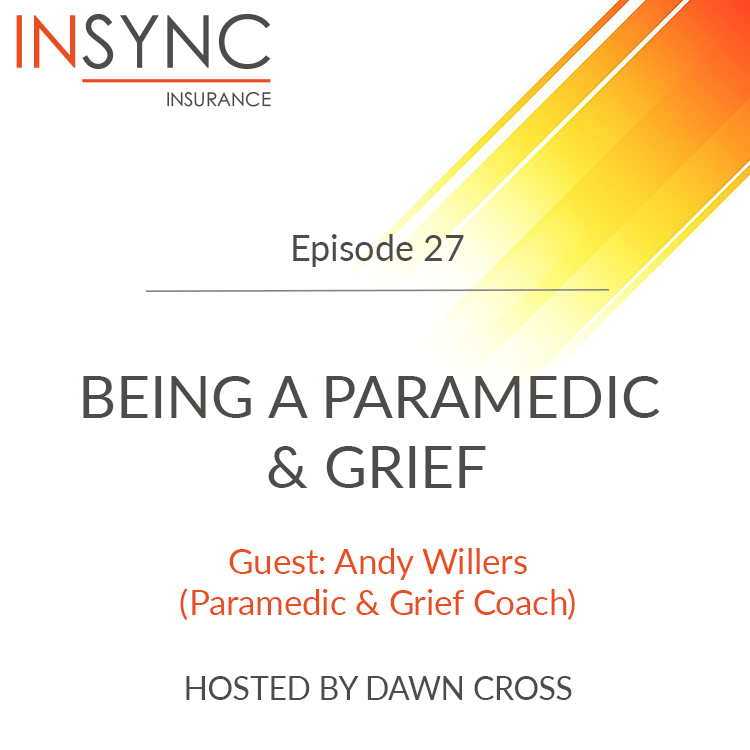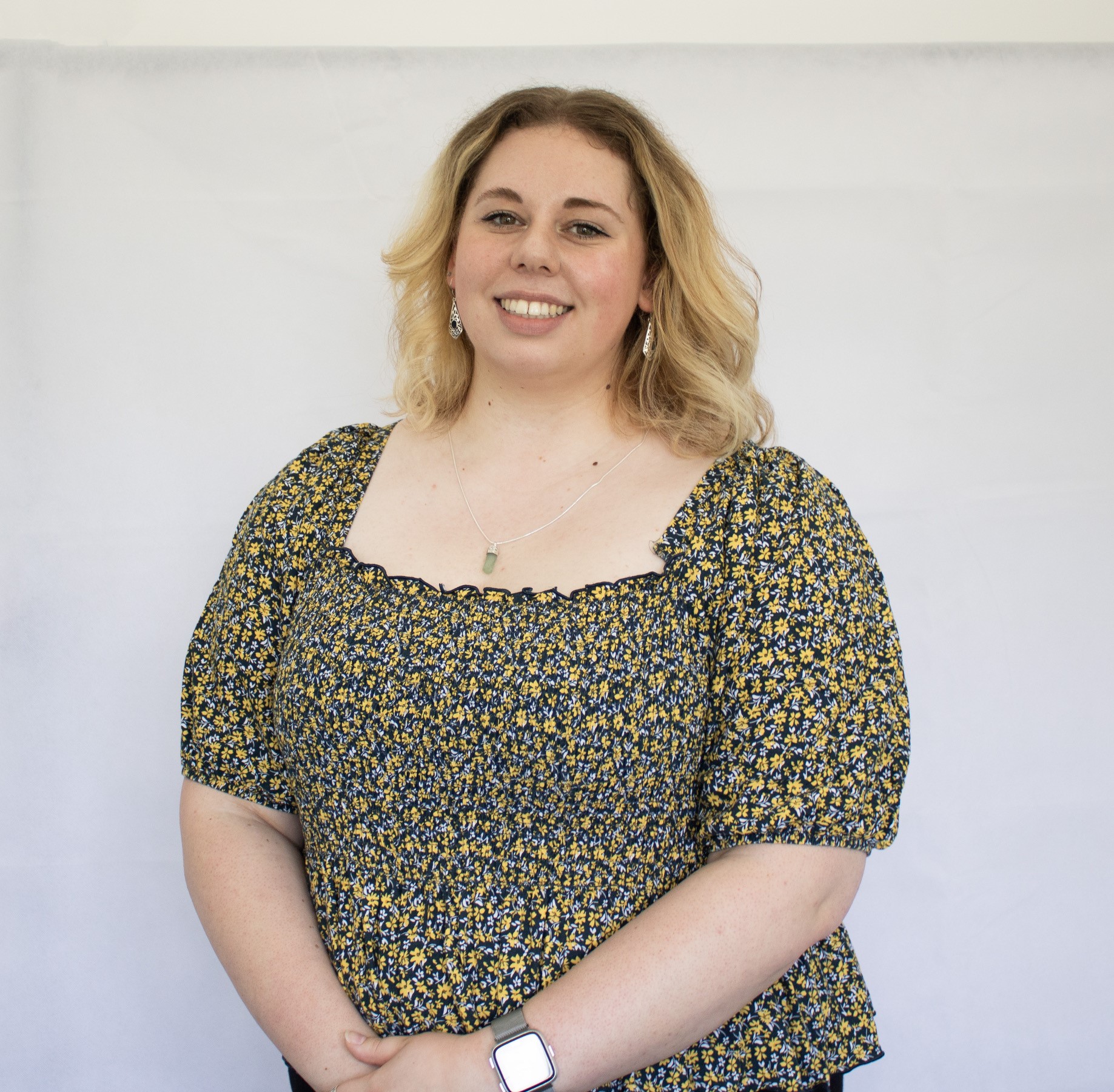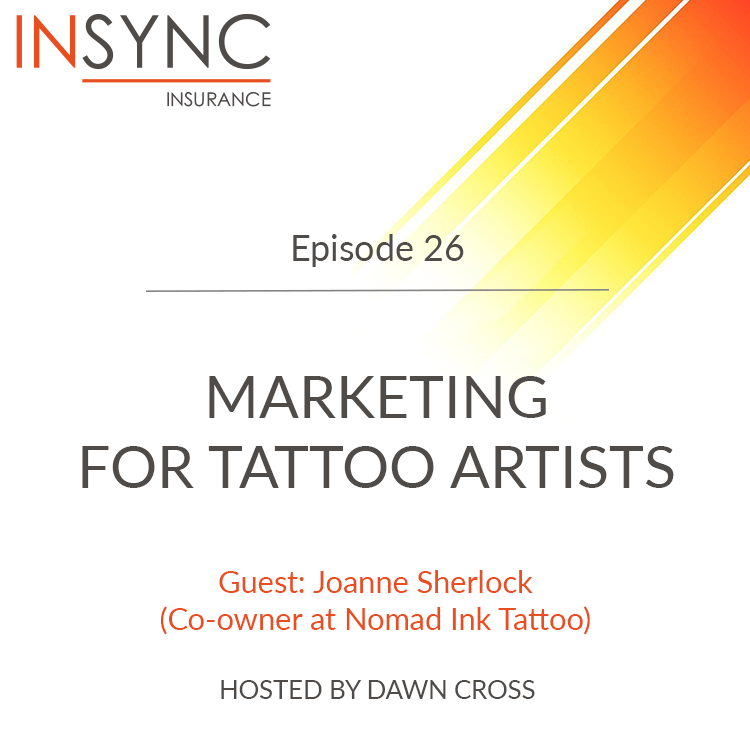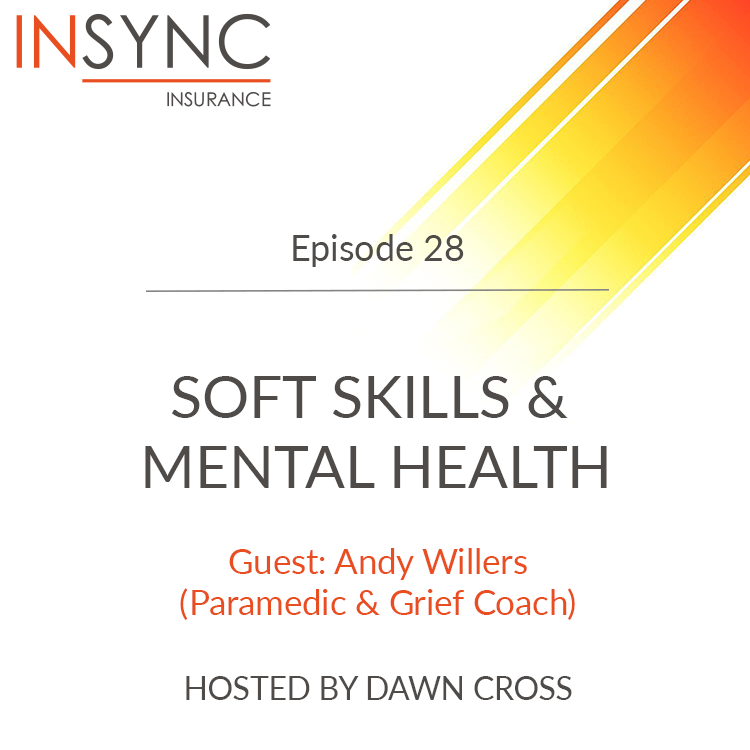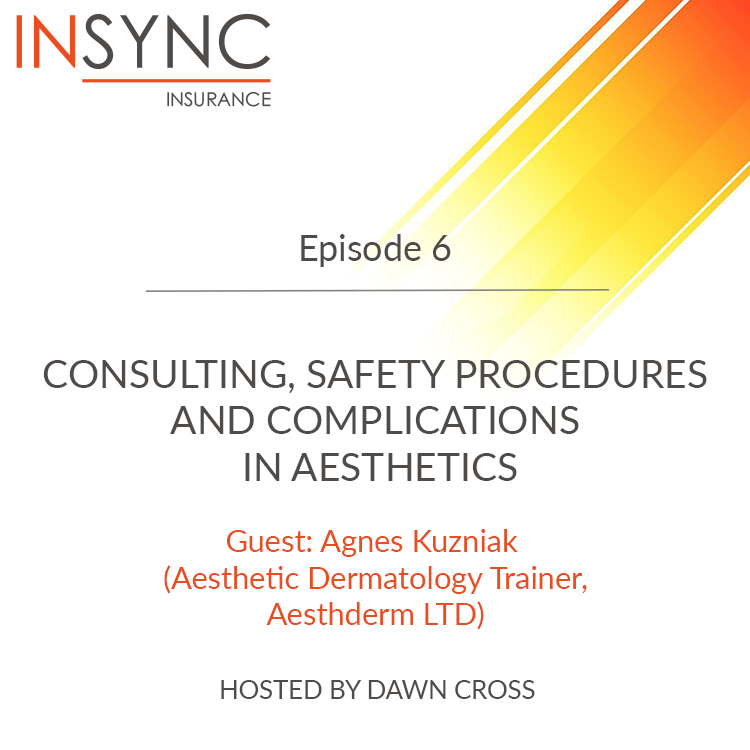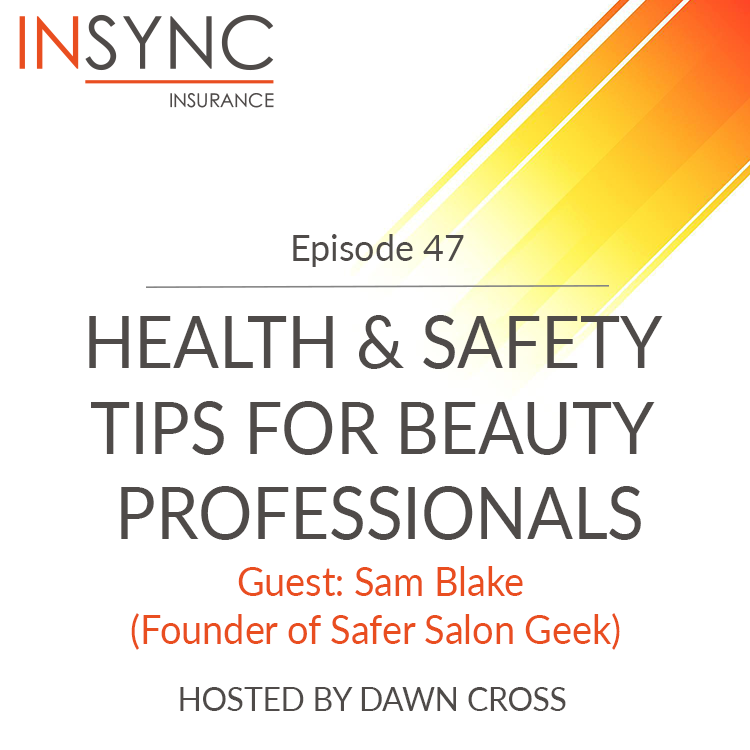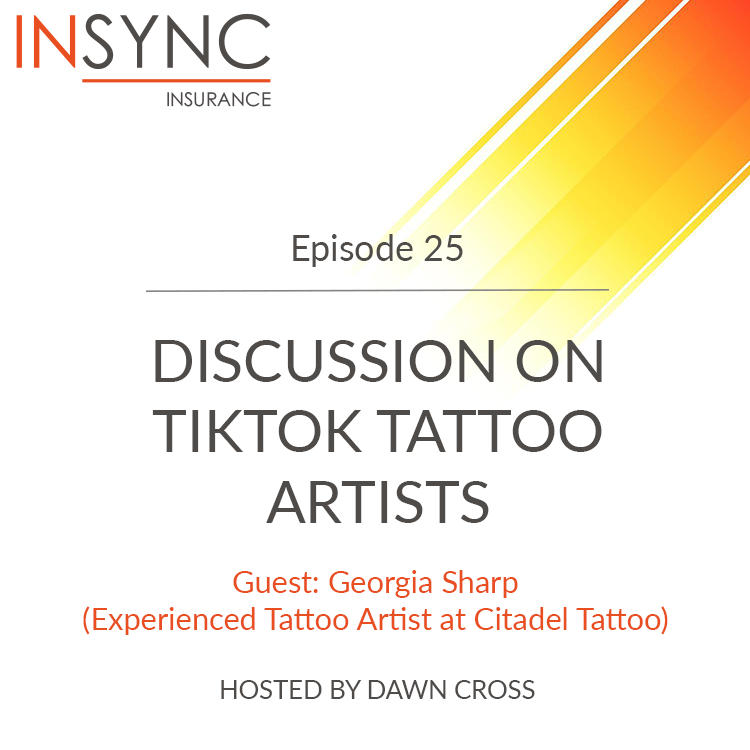Episode Transcript
Speaker 0 00:00:00 <silence> Welcome to the Insync Insurance Podcast. I'm your host, Dawn Cross, and today I'll be discussing paramedics and grief counseling with my guest, Andy Willers. If you enjoy our podcast, make sure to leave a rating on your favorite podcast directory.
Speaker 2 00:00:17 So, uh, as we start off with all podcasts, could you please introduce yourself and what you get up to?
Speaker 3 00:00:24 Hi, dong. I'm, uh, I'm Andy Willers. Um, I've been a paramedic for a really long time. Um, over the last few years I've, I've moved into coaching because I was coaching and mentoring within healthcare quite a long time. Um, and, and then actually I realized that coaching was, was kind of what I like doing. And, and initially I was just gonna be, you know, I was gonna, I was gonna coach everyone and everything. Uh, but what I've discovered is that there's a real synergy between the work that I've done as a paramedic and working in a space around sort of grief loss and end of life. So I'm still a practicing paramedic. Uh, I work in a primary care setting rather than on a traditional ambulance. And alongside that, I have, uh, a grief coaching practice.
Speaker 2 00:01:13 Well, sounds amazing. Could you tell me a bit more about your grief coaching practice, since obviously that's something that's really key and I think almost like underfunded. I think that should be absolutely everywhere.
Speaker 3 00:01:24 Yeah, that's really interesting. I, it is something I've found a lot over the years. You know, I've spent a lot of time with, with people either at the end of their life or people that have just lost somebody. And, and I've noticed that there's a real gap for people to, to help people to move forward. You know, the grief coaching is a relatively new phenomenon. Uh, there's always been grief counseling, but grief counseling tends to work with historic stuff where we're stuck in a place that's dictated to by grief. Whereas grief coaching is about moving people forward through the, the, the, the pathway of grief and accepting that grief is a normal part of everyday life. So what I always say to people is, if you're stuck, you need a counselor. If you're wanting to move forward, then coaching's a really good way of moving through that process.
Speaker 3 00:02:17 I'm also finding it's really useful for people that are approaching the end of life. So, so a lot of people know that they're gonna die, have got a lot of things that they want to get tidied up and they want to move forward through the process. I've, I've started working with a, with a celebrant, and she's helping people to write their own celebration before they pass. And I, and I, and I'm helping people to have conversations with their loved ones. Uh, I'm helping people to get some practical stuff in place. I've been doing some work around Swedish death cleaning, which is where we just tidy everything up, you know, both physically and emotionally. You know, we make sure that we've had the conversations. We, we help people to understand of the things that are gonna be left behind, what things are important and what things aren't important. Yeah, it's really interesting actually. I've just, I've just taken a role with a GPS practice in Wandsworth, and I'm, I'm gonna be working as a paramedic, but also as a coach to, to work with their patients that are at the end of life, which I'm super excited about. They're, they're really forward thinking and they're, they're, they're just a really lovely group of, group of gps that, that want to do the right thing.
Speaker 2 00:03:32 No, definitely. I really love how as well, I think obviously we all need to come to grips that obviously, depending on what life varies at us, you know, we will transpire at some point. All of us
Speaker 3 00:03:44 Guarantee
Speaker 2 00:03:44 It. Yeah. You know, no one's immortal. We really haven't figured that out at all. And, um, being able to kind of come to terms with it and be with someone like you, I think is absolutely amazing. And I think, you know, even if it's just stuff like, you know, if you've got a fellow paramedic who's unfortunately witnessed maybe even their first step on the scene and stuff like that, that can be very impactful. And being able to work towards and even past that sounds brilliant. Do you work with a lot of paramedics?
Speaker 3 00:04:16 I do. And actually that was, that was one of the ways that the grief coaching started off was because there's always been a, a history of death being dealt with, with within pre-hospital care with dark humor and a cup of tea that, that was kind of, you know, never to be spoken to again. But I know that every paramedic I've ever spoken to has got one significant, two significant, a dozen significant deaths that they still carry with them and, and have no real way of, of talking it through or moving it forward. And, and, and we know that that grief can be cognitive. And, and if you are, if you're working through a career and, and, and you are, you are seeing death after death, or you are, you are dealing with grief time after time, after time and time that sits with you. And then also your own losses, your own grief that sits in that great big pile as well. And sometimes that can become unbearable. We're seeing really high burnout rates within paramedic, you know, within the paramedic career at the moment. I, I read somewhere, and I'm not sure if this is true, but four years is about how long paramedics are lasting before they move in on to something else. And grief will be a part of that.
Speaker 2 00:05:35 Definitely. I think there should be more research done and possibly new strategies in place because I mean, from my point of view, I, I wouldn't be able to personally be a paramedics. I know that the grief would sit with me immensely and like, you know, they've gotta carry on and go literally onto the next job. And it's highlighted, you know, with these medical shows like, uh, 24 hours in a and e and that sort of thing. You do see that kind of side, but there's just not much support, which is insane really.
Speaker 3 00:06:03 And I think it's really interesting because the, the, the route into becoming a paramedic has changed drastically over a very short period of time. And where people would've traditionally have worked through the ambulance service, maybe started with patient transport and then worked as technician and then maybe gone on at a later date to, to, to do their bag and become a paramedic. Now, because we're much more academically focused and the things that are expected of a paramedic are very different, people are typically now coming into the service or into the profession through a university route, which may mean that they've come straight from school to university and then from university into an ambulance service. So their, their life experience is very different from older paramedics like myself, that, that maybe had done quite a lot of other stuff before we became paramedics.
Speaker 2 00:07:00 I know I've seen students, they do tend to have their, their placements as well. They do work within it, but I think, like you said, it's really, I think it's like you, you just learn more and able to hope more if you start small and you work up to something like this. You know, even, you know, if you're training to be a surgeon, you still had a lot of different experience in different areas before you got to that point because of, you know, how much skill and knowledge it takes. And I think, I feel like, you know, the older way probably would be best to still hang onto, but obviously we don't have the, we don't have the tools necessarily to be able to figure it out in such a way,
Speaker 3 00:07:37 Some interesting, um, apprenticeship schemes that are offering an ability for people to, to, to learn whilst on the job. But I I I, I feel that the way that the, the profession has changed the same as nursing did. It's very much university entrance and, and that's right and proper because, you know, we, we, we need that academic underpinning knowledge. But the problem is, it seems to me that the, the university route doesn't necessarily lead itself to, to giving you the, the hands on experience that you need.
Speaker 2 00:08:11 And I think as well, a phenomenon that I experienced myself and a few of my own peers when I graduated from university is that, um, you know, part of your identity itself is just, you know, you were in school, so when you finally kind of graduated into adult life, you do feel a little bit kind of lost because that structure that's been hammered into you is completely gone hoping to become an adult. Like I, I can speak for myself for my own adv university, but I don't see many other universities actually preparing you for adult life, let alone really big, scary experiences like having to deal with deaths grief, but also like, you know, how do you make your budget properly when you, you know, don't have a student loan coming in. You need to make, make sure that your own paycheck is good, you know, applying for jobs and being realistic about your options. You know, it's just not really taught. You are thrown in a deep end, and especially if you're graduating then into, you know, um, a medical setting, obviously you're dealing with that, but then also dealing with the whole new threshold of challenges by, you know, being in a medical setting and it's not always fun and games, you know, it's, uh, a bit intense <laugh>.
Speaker 3 00:09:21 Yeah. And I'm sure if you throw shift work in, in on top of that, you know, that, that then there's, there's a whole world of stress that, that people are having to deal with. And, and even with the newly qualified paramedic programs that the, the ambulance services are running now, there, there's still a big expectation. I was just gonna say, I, I remember there was, there were no newly qualified paramedic program when I, when I started, when I, when I, when I qualified as a paramedic, I think I had maybe one shift with another paramedic, and then I was on my own. And the very first job I went to on my first day as a newly qualified paramedic on my own was a man that had been attacked with a hammer in Tesco's. Wow. I really wasn't prepared for it.
Speaker 2 00:10:06 No, I bet. Especially that's quite a brutal kind of attack. So how to see the aftermath must be really intense.
Speaker 3 00:10:14 Yes, it's set the tone, but then I think, you know, another thing that maybe paramedics don't expect when they're nearly qualified is that yes, we get that big stuff, but they may spend weeks and weeks and weeks and weeks and weeks go into stuff that they feel overqualified to deal with or they feel is maybe unnecessary or just, just routine work. Because most of what they'll see as a paramedic is, is routine day-to-day stuff that doesn't need those big skills, doesn't need that big thinking. So you could go through that period for a while, and then all of a sudden, then you've gotta deal with that great big traumatic, um, and the expectation is that you can swap from one to the other and then go back to doing that same routine work over and over and over again.
Speaker 2 00:11:09 Yeah. And there's no kind of processing time really, is that There's no kind of, okay, give yourself a break. I mean, you might be able to have a, a, a, a physical break after something like that if there's no other calls for the ambulance to go somewhere else once you finish. But it's, um, it does seem to be that it's kind of like, yeah, get up then carry on, and now you need to go help with like a smaller matter that isn't as traumatic, but you're still reeling from one that you've just attended.
Speaker 3 00:11:38 Yeah. And that, and that's very much, you know, the ambulance services are horrifically busy, and so the expectation is that you will be ready as quickly as possible to go and do that. Next thing, and don't get me wrong, you know, the team leaders and the more experienced staff are all very good, but often it's, it's informal. Um, I mean, I've, I've not worked in a, in an ambulance service per se for a long time, but, but I still speak to, I still speak to a lot of paramedics that are working in ambulance services and, and I know there's a push to make the services more supportive, but with the time pressures that there are, it's very, very difficult.
Speaker 2 00:12:17 Oh, definitely. And especially with being underfunded and all the other problems going on, like, I think the last thing they're gonna look at is making sure that the mental health of everybody is, is in good condition, which in, in is insane, really, you know, we should be looking after every part, especially as they're really key workers. But unfortunately in this day and age, it's just not something that's talked about. Uh, you know, it not necessarily taboo anymore, but sometimes they just physically don't have time to like check in and then before you know it, they print out and then obviously there's, they're not in the service anymore and they go to something different. But then obviously there'll be a shortage. <laugh>
Speaker 3 00:12:56 And Al also, I think that that, you know, the paramedic career is so much broader than it ever was. There are so many different things that people can do. And, and if you've, if you are feeling burnt out, then some of those other things may seem really attractive.
Speaker 2 00:13:12 Mm-hmm.
Speaker 3 00:13:13 And so people are progressing through their career much quicker than they ever did in the past. You know, often before people would qualify as a paramedic and retire as a paramedic on an ambulance, that that was a normal process. They may, they may have had, you know, 20, 30 years within an ambulance service. Whereas now there are so many opportunities in primary care, in disability assessment, in errored, in urgent treatment, you know, offshore work, in international work. There's a whole world of things that people can do, and sometimes it seems really tempting to, to, to jump from one place to another, thinking that the grass will be greener. But actually all of those things come with their own pressures and their own stresses. Yeah.
Speaker 2 00:14:01 Um, so moving on then, obviously the, you know, we've kind of picked apart like a few issues the profession can come with, but it can also be relatively very rewarding as well. And it's something that if you thrive in the environment, I think, you know, obviously you would absolutely smash it. Um, I wanted to know, like, what advice would you give to those looking to become a paramedic or even maybe those that are freshly certified? Like how can, what advice can you give them to them on the job?
Speaker 3 00:14:31 Oh, I see. I mean, it is the, you know, don't, don't get me wrong, it's the best job in the world. I've thoroughly, thoroughly enjoyed my time as a paramedic. And I, and I'm carrying on, you know, I still working in primary care now, and I, and I love it. And I love the interaction with people. Um, I think the advice I'd give people is to look after themselves. I think mentally we need to look after ourselves physically, we need to look after ourselves, you know, I see, I see a lot of old paramedics with bad backs. I see a lot of people that, that prioritize working over taking care of themselves physically, you know, eating well, sleeping well, not always easy. And I, I would encourage people to be really open about the opportunities there. There are, I know I said people jump ship because they feel like it, the grass is greener, maybe.
Speaker 3 00:15:20 But you know what, there are some absolutely incredible opportunities out there for paramedics. We're really well placed as independent practitioners that can go off and do some really exciting stuff and, and, you know, the door's opening every day to, to paramedics to do new stuff. You know, we are, we're now prescribing, we're working in in general practice, we're working in hospitals, we're doing all sorts of exciting roles. I mean, I, I was really fortunate to spend years flying around the world, bringing, bringing people back that needed to be looked after, which was just a, the most amazing experience. You know, I, I genuinely have passports filled with stamps and, and so many great experiences. So I, I would be, I would say look after yourself mentally, look after yourself, physically be open to opportunity and, and, and, and enjoy your contact with people because that really is the joy that, that, that's, I, for me, that feels like that's where the gold is, is in the, is in the interactions that you have with people and knowing the difference that you make. There's, there's this thing, isn't there, I, I'm quite unique looking, so I get, I get people come up to me from time to time going, oh, you did this thing. You were so kind and you looked after me or my mom. And I'm like, yep, probably I, and, and <laugh>,
Speaker 3 00:16:49 They, I might have been the only paramedic they ever met. I've met lots of patients. I had lots of interactions, some I remember many, many I don't. But, but just hold the impact that you do have on people because it's, it's really quite profound. And there are not many roles in this life that give you the opportunity to have such deep and meaningful impact on somebody's life. You know, the way that you treat somebody, whether it's a routine job or the biggest job that you ever go to, that that will stay with people and that will be how you'll be remembered.
Speaker 2 00:17:25 Oh, sounds amazing. I think as well, um, you know, especially if the patient is scared and everything else, like the last thing they need is be more scared. So the fact that you can impact them in such a positive way, but you know, it's fine. We're here, you're sorted. You know, end up maybe just having a bit of a, a gaba by something really random to keep my mind off. Things I know from my experiences with a paramedic, uh, I fainted at school when I was young. <laugh>, you know, they were just super lovely, just super chill and just be like, it's okay. We'll just sort you out. And having that impact as well is great because it, people I think will feel if they ever have an emergency again, they know that they're gonna be looked after. And especially when it's stuff, you know, they have no control over it. The last thing they need is to be more panicky. And paramedics are so amazing, uh, just to help keep you calm, but also thought you out and get stuff sorted that, you know, it sounds like such a rewarding fashion. And I think if I wasn't so scared of blood, I would love to do something a bit more like that. But I, blood, blood and needles me, I can't do it. Which is why I went into marketing instead. <laugh> <laugh>.
Speaker 3 00:18:33 The funny thing is, before I became a paramedic, I thought I was scared of needles and I thought I would faint every time I saw blood
Speaker 2 00:18:40 <laugh>. Really?
Speaker 3 00:18:41 Yeah. I think it's interesting. I think, you know, if like, if I'd watched it on the TV before, I mean, I'd never watched medical programs because I'd feel quite queasy. I think it goes back to that, that connection with people. And I think when you are connected with somebody, then your relationship to all the other stuff that's going on takes a bit of a sideline because actually where your, where your thought is, is focused, is on, as you say, reassuring that person, letting them know that they'll be safe, because that's probably the most important thing you ever do. Mm-hmm.
Speaker 2 00:19:19 Oh, definitely. And it, you know, there's the, the mental benefits for the physical where it can physically like lower their, uh, cortisol levels and stuff like that, which could also harm the body. 'cause you know, it's in fight or flight, it's all confused. Yeah. So being able to calm that down obviously is a major plus. I, I believe, anyway. I, okay. Again, not a medical professional <laugh>.
Speaker 3 00:19:43 It, it's interesting 'cause I'm sure that's how I ended up coaching was because of that, you know, that, that understanding of how those deep connections, you know, how, how important they are.
Speaker 2 00:19:55 No, that's really key. Is there anything else you'd like to add before we wrap up the episode?
Speaker 3 00:20:01 No, I'd, I'd, I'd like, I'd like to say thank you and I, I think it's really important that we, that, that we do get some sort of fluffier stuff out to paramedics. You know, I, I feel like there's, there's a big focus on the, the technical skills and not enough focus on the people skills and the connection. And, and for me that feels like the difference between an amazing paramedic and a good paramedic.
Speaker 2 00:20:30 Uh, Stephanie Gu. Well, thank you so much for coming on the episode.
Speaker 3 00:20:33 Oh, it's been a pleasure. I really enjoyed it.
Speaker 0 00:20:36 Thank you to my guest today, Andy Willis discussing his experience as a paramedic on what led him to Grief Coaching. If you're interested in the services, please check out the podcast description. I have been your host on Cross in tune next week for another episode. NSYNC is one of the UK's fastest growing insurance providers offering comprehensive cover for SMEs and the self-employed across the uk. Our expert team can tailor your insurance to meet your individual business needs and compare prices from a Lloyd's of London approved partners. We offer a five star service and have been FIFO Platinum trusted winners for years in a row.
